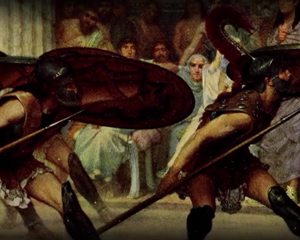Hey there. I'm Mike Rugnetta, this is Crash Course Theater, and today we're traveling to ancient Greece to uncover the origins of Western drama.
嘿大家好,我是我是迈克·鲁格内塔,这里是戏剧速成小课堂,今天我们要去古希腊探索西方戏剧的起源。
Right, Dionysus?
对吧,狄俄尼索斯(古希腊神话中的酒神)?
He's… He's still hung over.
他……他还在宿醉。
My dude, this is your episode. You gotta get up!
伙计,这是你的专场,你得醒过来啊!
If we believe the ritualism theory from last episode, then eons of religious or quasi-religious rituals eventually birthed drama.
如果我们相信上一集讲的仪式主义理论,那么就是亿万年前的宗教或者准宗教仪式最终诞生了戏剧。
But how?
但过程是怎样的呢?
Well, it has to do a bunch with our grape-loving friend over here.
嗯,这就得和我们这位酒鬼朋友一起好好梳理一番。
By the 6th century BCE, Dionysus had become a very popular God in Greece, especially among the ladies.
公元前6世纪,酒神狄俄尼索斯成为希腊的一个非常受欢迎的神,尤其受女同志的欢迎。
According to some maybe true, maybe not reports, women participated in a ritual where they'd run through the countryside, tear apart some animals, and then, come home.
据一些真真假假的传闻说,这些女同志们参加了一个仪式,她们跑着穿过整个村子,扯碎一些动物,然后,又回到家。
It's fun right?
是不是很搞笑?
And if you want to know more about it, you can check out The Bacchae by Euripides. It is great.
如果你想了解更多,你可以去看看欧里庇得斯(希腊的悲剧诗人)的作品《酒神的女伴儿》,很伟大的一部作品。
Whether or not that happened, we do have good evidence that in the 6th century BCE, some less wild rituals celebrating Dionysus spread through Greece.
不管故事是否属实,我们确实有充分的证据表明在公元前6世纪,确实有那么一些火遍了希腊的还算规矩的庆祝酒神的仪式存在。
One of the most popular involved a procession from Eleuthera to Athens, where worshipers lofted a giant phallus and sang songs called dithyrambs in praise of... you know who.
其中最受欢迎的是一支从伊柳塞拉岛来到雅典的队伍,队伍里的信徒们托着一个巨大的阳具,唱着名为“酒神颂”的歌曲来赞美……你知道赞美谁。
And one theory about those dithyrambs actually is that eventually they evolved into theater, when singers started acting out the action instead of just singing it.
有一种关于酒神赞美歌的理论认为,当歌手们不再唱歌而是用动作将赞美歌曲表演出来的时候,这些表演的过程便最终演变成了戏剧。
Aristotle and his followers think that sooner or later, a singer stepped out of the dithyramb chorus and started acting out individual characters.
亚里士多德和它的追随者们认为,前后不久的时候便有一名歌手离开了赞美酒神的歌唱团开始单飞表演自己的个人角色。
This actor was called Thespis.
这个演员就是泰斯庇斯(古希腊诗人)
Like, actually, that was his name, and that's where we get the noun thespian.
就像,其实,“Thespis”是他的名字,这也是名词“thespian(戏剧的;悲剧性的)”的由来。
According to stories, Thespis learned to switch between characters, and to enhance the effect, he got the bright idea to use masks.
据故事所述,泰斯庇斯学会了角色转变,为了使效果更加明显,他便想出了戴面具这一招。
This was Greek tragedy in its earliest form.

One actor paired with a chorus.
一个演员配有一个合唱团。
It still sounded a lot like a dithyrambs or like a bard reciting a portions of epics as banquet entertainment, but the direct impersonation of a song's characters made it different.
听起来仍然很像酒神颂,也像吟游诗人在宴会上朗诵史诗助兴的感觉,但不同的是,他们会直接去模仿歌曲中出现的人物。
And it continued to develop, adding actors and architectural elements for about 150 years.
然后它又在150年的时间里不断地进行演变、增加演员并且增添了建筑上的元素。
Tragedy, by the way, derives from the Greek words for goat and song, which may have had to do with animal sacrifices that were made during the festivals.
总之,“悲剧”这个词来源于希腊用来表示“山羊”和“歌曲”的文字,这两个文字可能和节日期间进行的动物祭祀有所关联。
Or it may just be another reference to satyr.
或者,它也有可能只是参考了单词“satyr”(好色之徒;萨梯(希腊神话中森林之神))
Theater eventually gets institutionalized in Athens.
戏剧在雅典最终被制度化了。
Late in the sixth century BCE, pre-democracy Athens was ruled by a tyrant named Peisistratus.
公元前6世纪晚期,尚未被民主化的雅典被一个叫作佩西斯特拉托斯的暴君所统治。
Peisistratus came to power through violence, but once he was in charge, he wanted to unite and strengthen the city.
佩西斯特拉托斯通过暴力夺取到政权,他掌权后便想让城市变得更团结更坚固。
He decided that festivals, particularly those in praise of Dionysus, would be a good way to get everyone on board because wine.
他觉得节日,特别是赞美狄俄尼索斯的节日,是可以用来团结国民的好办法,因为大家可以一起喝酒。
So in the 530s BCE, he expanded one of the God's pre-existing spring festivals and turned Athens into city Dionysia with a theater competition at its center.
因此在公元前530年代他便把之前作为神的节日之一的春节给放大化了,把雅典变成了一个以戏剧比赛为主的酒神之城。
Now, this festival wasn't only about theater, it was also about reaffirming Athens as a source of pride and power.
现在,这个节日不仅和戏剧相关,它也是在重申雅典是荣耀和力量的源泉。
It lasted five or six days and included a lot of events: military and political leaders poured out libations, tribute from cities of the Athenian Empire was displayed on stage.
这个节日会庆祝五六天,期间会有很多项目,包括:军队和政治领袖们举行奠酒祭神仪式,展示来自雅典帝国各城的贡品。
Names of men who greatly benefitted Athens were read out.
宣读对雅典做出突出贡献的人的名字。
Children of soldiers who had died in war and had now reached maturity were brought on stage.
把那些在战场上牺牲的士兵们的孩子带到舞台上面。
There were also dithyramb contests.
还有酒神大赛。
The theater competition took place in an outdoor amphitheater in front of a crowd of about 14,000 spectators.
戏剧比赛是在一个露天剧场举行的,有大约14000名观众。
That likely included the whole range of Athenian society, even women and slaves, but of course, only male citizens could perform in the chorus or vote for Best Play.
这些观众来自雅典社会各阶层的人士,甚至有妇女和奴隶,但是当然了,只有男性公民才有权利参加合唱和给最佳戏剧演出投票。
The contest was between three different playwrights each had to submit a tetralogy a four-part work.
比赛选手为三名不同的剧作家,每个剧作家都必须提交一部由四个部分组成的四联剧。
The first three parts were linked tragedies and the fourth part was a satyr play which was lewd and usually involved a lot of prop penises.
前三部分是剧情连贯的悲剧,第四部分是一部色情剧,很肮脏下流,剧中会出现很多“棒子”道具。
In 486 BCE, a comedy competition was added.
公元前486年的时候又增加了喜剧比赛。
Once competing playwrights were chosen, they were matched with a prominent Athenian citizen, who would bankroll the production.
竞争力很强的剧作家被选中后便会和一名杰出的雅典公民进行匹配,该公民则为剧作家们提供创作戏剧的资金上的支持。
Our big spender was called the choregos, and it was his job to assemble the chorus hire the flute player, and buy the masks or any other set furniture, like a bed or a throne.
我们的大财主被称为“choregos”,他们的工作就是组织合唱团、雇笛子手、购买面具或其他固定的家具,比如床或者龙椅。
The playwright usually did the jobs that we now associate with director, composer, and set designer. Sometimes they even acted in their own work, alongside other performers.
那些剧作家的工作就和我们现在的导演、作曲家和布景设计师的工作类似,他们有的时候也会和其他演员一起出演自己的作品。
There may have been up to three actors on stage and then the chorus.
舞台上最多可能只有一支合唱团和另外三名演员。
Unfortunately, none of the music from these shows remains, but there are some painted vases that suggests what productions may have looked like.
遗憾地是,那些演出里的音乐并没有传下来,只有一些彩绘的花瓶上面能大致看出那些戏剧表演的内容。
Fun fact, the chorus would sometimes dance.
有意思的是,合唱团有时也要跳舞。
I wonder how hard it is to high kick in a toga.
我一直很疑惑他们是怎么穿着托加长袍(长约6米,最宽处约1.8米的羊毛制兼具披肩、饰带、围裙作用的服装)做高踢腿动作的。
For a look at the theater structure itself, let's go to the thought bubble.
我们先来看看剧场本身的构造吧。让我们请出思想泡泡。


